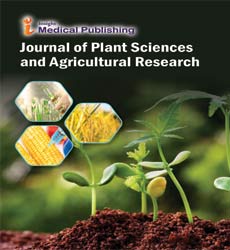Agronomy's Evolving Role in the Age of Technological Advancements
Lucas Almeida*
Department of Agronomy, Technical University of Munich, Munchen, Germany
- *Corresponding Author:
- Lucas Almeida
Department of Agronomy, Technical University of Munich, Munchen,
Germany,
E-mail: almeida_l@tumf.gr
Received date: August 28, 2024, Manuscript No. IPJPSAR-24-19147; Editor assigned date: August 30, 2024, PreQC No. IPJPSAR-24-19147 (PQ); Reviewed date: September 13, 2024, QC No. IPJPSAR-24-19147; Revised date: September 20, 2024, Manuscript No. IPJPSAR-24-19147 (R); Published date: September 27, 2024, DOI: 10.36648/ipjpsar.8.3.156
Citation: Almedida L (2024) Agronomy's Evolving Role in the Age of Technological Advancements. J Plant Sci Agri Res Vol.8 No.3: 156.
Description
Agronomy, often regarded as the science and practice of crop production and soil management, lies at the intersection of agriculture, ecology and technology. It contain a wide array of disciplines, from soil science and plant genetics to pest management and environmental conservation. The multifaceted domain of agronomy, delving into its significance, key principles and evolving role in shaping sustainable agricultural systems.
Agronomy serves as the fundamental of modern agriculture, providing the scientific foundation for optimizing crop production while minimizing environmental impacts. By understanding the complex interactions between soil, plants and environmental factors, agronomists develop strategies to enhance soil fertility, crop nutrition and water use efficiency. Moreover, agronomy plays a pivotal role in addressing global challenges such as food security, climate change and natural resource conservation, offering innovative solutions to sustainably feed a growing population.
Key principles of agronomy
At its core, agronomy is guided by several fundamental principles aimed at maximizing agricultural productivity while preserving ecosystem integrity. Soil management lies at the heart of agronomy, emphasizing practices such as soil testing, nutrient management and erosion control to maintain soil health and productivity. Crop selection and rotation strategies are devised to optimize yield potential and mitigate pest and disease pressures. Additionally, agronomy promotes Integrated Pest Management (IPM) approaches, emphasizing biological, cultural and chemical control methods to minimize pesticide use and environmental risks.
As agriculture grapples with intensifying environmental pressures and changing climatic conditions, the role of agronomy in further sustainability has become increasingly paramount. Sustainable intensification, a concept central to modern agronomy, seeks to enhance agricultural productivity while minimizing negative environmental impacts. This entails adopting practices such as conservation agriculture, agroforestry and precision farming, which promote resource efficiency, biodiversity conservation and climate resilience.
The integration of technology has revolutionized agronomy, empowering farmers with innovative tools and decision support systems to optimize production outcomes. Remote sensing technologies, including satellite imagery and drones, enable realtime monitoring of crop health, soil moisture and pest infestations, facilitating targeted interventions and resource allocation. Furthermore, precision agriculture techniques, such as variable rate application of inputs and automated machinery, enhance efficiency and reduce environmental footprint by minimizing input wastage and optimizing resource utilization.
Despite its significant contributions to agriculture, agronomy faces various challenges in its quest for sustainability. These include the need to address soil degradation, water scarcity and biodiversity loss, exacerbated by intensive agricultural practices and climate variability. Additionally, agronomy must navigate socio-economic complexities, ensuring that sustainable farming practices are accessible and equitable for smallholder farmers worldwide. Looking ahead, agronomy is poised to embrace emerging technologies such as gene editing, biotechnology and artificial intelligence, offering new avenues for enhancing crop resilience, nutritional quality and environmental adaptability.
Conclusion
Agronomy stands as a dynamic field at the forefront of agricultural innovation and sustainability. By integrating scientific knowledge, technological advancements and socio-economic considerations, agronomy holds the key to unlocking the full potential of agriculture to nourish both people and the planet. As we confront the challenges of the 21st century, agronomy will continue to evolve and adapt, serving as a beacon of hope for a more resilient and prosperous agricultural future.
Open Access Journals
- Aquaculture & Veterinary Science
- Chemistry & Chemical Sciences
- Clinical Sciences
- Engineering
- General Science
- Genetics & Molecular Biology
- Health Care & Nursing
- Immunology & Microbiology
- Materials Science
- Mathematics & Physics
- Medical Sciences
- Neurology & Psychiatry
- Oncology & Cancer Science
- Pharmaceutical Sciences
